
Many parents enjoy tickling their babies and watching them laugh, but they may not know why babies are ticklish or how to get them to laugh.
There are many theories as to why babies are ticklish, but the most popular one is that it is a survival instinct. When babies are born, they are unable to fend for themselves and are very vulnerable. Tickling helps them to learn how to protect themselves and defend themselves from predators.
Despite the fact that tickling is a survival instinct, it is also a way for parents to bond with their babies. When parents tickle their babies, they are building a trusting relationship and teaching their babies that they are safe.
If you want to get your baby to laugh or smile, there are a few things you can do. First, try tickling their feet or toes. Babies are often ticklish in these areas. You can also try tickling their stomachs or under their arms. If your baby is not responding to tickling, try making funny faces or sounds.
When Do Babies Get Ticklish?
Newborn babies are not generally ticklish because they are not yet aware of their limbs and cannot control their movements. This starts to change around 3 or 4 months old when babies start to become aware of their surroundings and their own bodies.
They will begin to laugh and squirm when someone touches their belly or tickles their feet. By the time they are a year old, most babies are very ticklish and will often laugh uncontrollably when tickled.
At What Age Can You Tickle A Baby?
Some babies might enjoy being tickled as early as a few weeks old, while others may not like it until they’re a few months old. If you’re not sure whether your baby likes being tickled, just watch their reaction. If they start giggling or smiling, then they’re probably enjoying it. If they start to cry or look uncomfortable, then it’s best to stop.
How to Handle a Ticklish Baby?
To handle a ticklish baby, try the following tips:
Tickle them back: If your baby starts to giggle, tickle them back and see if they continue to laugh. This can help get them used to the sensation and may make them less ticklish overall.
Use a distraction: If your baby is ticklish in a particular spot, try to distract them with a toy or another activity. This can help take their focus off of the ticklish sensation.
Try tickling them differently: Some babies may not be as ticklish if you tickle them lightly instead of hard. Experiment with different techniques and see what works best for your child.
Is It Safe To Tickle Babies?
Absolutely! Ticking babies is not only safe, but it’s also a great way to bond with your little one. Plus, it can help them learn about their bodies and develop a sense of humor. Just make sure to do it gently and never force them to keep tickling if they don’t want to.
What are the Benefits of Tickling a Baby?
There are many benefits to tickling a baby. It can help them bond with their caregiver, it can help them to learn about their bodies, and it can provide them with a sense of security and comfort.
When tickling a baby, be sure to do it in a gentle and playful way. This will help them to feel safe and secure, and it will also help to prevent them from becoming overwhelmed or upset.
Is It True If You Tickle A Baby’s Feet They Will Stutter?
There’s no scientific evidence to support the claim that tickling a baby’s feet will cause them to stutter. While some parents may believe that it’s true, there’s no real evidence to back up this claim.
So, why do some parents believe that tickling a baby’s feet will cause them to stutter? One theory is that when you tickle a baby’s feet, they may reflexively move their feet, which can cause their speech to be disrupted. Another theory is that the tickling sensation may be overwhelming for some babies and can cause them to stutter.
However, there’s no need to avoid tickling your baby’s feet altogether. If you’re concerned about your baby’s speech development, you can always talk to your child’s doctor.
How Can You Make A Baby Laugh If They Don’t Like Tickling?
There are a variety of ways to make your baby laugh if they don’t respond to tickling. Try simple games like peek-a-boo, or make funny faces. You can also try singing or reciting nursery rhymes in a silly voice. If your baby is older, you can try playing catch or other simple physical games. The most important thing is to be patient and have fun!
How Can You Make My Baby Laugh For The First Time?
One of the best ways to make your baby laugh for the first time is by playing peek-a-boo with them. For example, you can hold a blanket up in front of their face and then lower it down so they can see you. This game is not only fun for your baby, but it also helps them to develop their coordination and visual skills.
You can also try making funny faces at your baby. Stick out your tongue, cross your eyes, or make a really big smile. Babies are often fascinated by these silly expressions and will giggle in delight.
Another great way to make your baby laugh is by tickling them. Gently tickle their tummy or their feet and see how they react. Just be careful not to tickle them too hard, as you don’t want to make them cry.
Finally, one of the simplest (and most enjoyable) ways to make your baby laugh is by simply spending time with them. Talk to them, sing to them, and cuddle them. Babies love being around the people they know and love, so just spending some quality time with them is sure to put a smile on their faces.
Why Is It Important To Get Your Baby To Laugh?
It’s important to get your baby to laugh for a few reasons. Laughter is good for baby’s health and development. It helps them bond with you and builds their self-esteem. Also, when a baby laughs, it’s contagious! So, not only will you be bonding and laughing together, but everyone around you will be happy too.
Can You Help A Baby To Stop Crying By Tickling Them?
There are a lot of old wives’ tales out there about how to stop a baby from crying, but does tickling really work? The jury is still out on this one, but there are a few things to consider before you start tickling away.
First, it’s important to figure out why the baby is crying in the first place. If they’re hungry, tired, or in pain, tickling is probably not going to do the trick. However, if they’re just fussy or overstimulated, a little tickle might just be the thing to calm them down. Just be careful not to tickle them too hard or too much – you don’t want to make them cry even more!
Do Babies Laugh For No Reason?
There are a lot of things that make babies laugh, and sometimes it seems like they’re laughing for no reason at all. But research has shown that there’s actually some science behind why babies laugh.
For one, when babies laugh, it’s often a sign that they’re happy and comfortable. Laughter is also a way for babies to socialize and bond with others. And finally, laughter can be a way for babies to release excess energy or relieve stress.
So next time you see a baby laughing for no apparent reason, know that there’s actually a lot going on behind that giggling facade.






